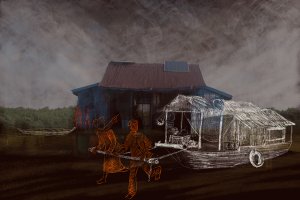Presented By: Center for Southeast Asian Studies
CSEAS Friday Lecture Series | Disorientations: Political Ecology of Displacing Communities from Cambodia’s Tonle Sap Lake
Sopheak Chann, Visiting fellow, Michigan State University

Attend in person or via Zoom. Zoom registration at https://myumi.ch/63JV3
This paper extends a theory of disorientations to reveal how attempts to fix and control both water and people are disrupting once-fluid relationships between the Tonle Sap Lake and communities who have lived with-on the lake for generations. Using ethnographic and participatory mapping methods, we examine the socio-ecological dynamics that preceded and succeeded in the forced relocation of three floating communities in 2018. It argues communities’ experiences challenge land-centric and event-centric understandings of displacement that pathologize fluid lifeways and fail to account for the materiality of water that has shaped floating villages; multi-generational relationships with their wetland ecology. The concept of disorientations illuminates villagers’ experiences of relocation within a collapsing aquatic ecosystem–a collapse catalyzed by state efforts to impose fixity on both hydrological flow and community mobility. The lens of disorientations invites displacement debates to consider materialities of place—whether pulsing water or living, shifting soils.
Sopheak Chann is a visiting fellow at James Madison Colleges, Michigan State University, and a lecturer at the Department of Natural Resource Management and Development, Royal University of Phnom Penh. He received his Ph.D. in Human Geography from the University of Sydney in 2017 and a master’s degree in Spatial Information Sciences also from the University of Sydney in 2009. He earned his environmental studies bachelor’s degree at the Royal University of Phnom Penh from 2002 to 2006. His research interests include critical development, environmental justice, the political ecology of the Mekong, critical cartography, and climate change. In addition to academic research, he has been conducting policy and legal research on land and resources politics in Cambodia with NOGs, including the United Nations Development Program (UNDP), the Cambodian Resource Development Institute, People In Need (PIN) Solidarity Centre (SC), Cambodian Development Resource Institute (CDRI) and Community Insight Group (CIG).
If there is anything we can do to make this event accessible to you, please contact us at cseas@umich.edu. Please be aware that advance notice is necessary as some accommodations may require more time for the university to arrange.
This paper extends a theory of disorientations to reveal how attempts to fix and control both water and people are disrupting once-fluid relationships between the Tonle Sap Lake and communities who have lived with-on the lake for generations. Using ethnographic and participatory mapping methods, we examine the socio-ecological dynamics that preceded and succeeded in the forced relocation of three floating communities in 2018. It argues communities’ experiences challenge land-centric and event-centric understandings of displacement that pathologize fluid lifeways and fail to account for the materiality of water that has shaped floating villages; multi-generational relationships with their wetland ecology. The concept of disorientations illuminates villagers’ experiences of relocation within a collapsing aquatic ecosystem–a collapse catalyzed by state efforts to impose fixity on both hydrological flow and community mobility. The lens of disorientations invites displacement debates to consider materialities of place—whether pulsing water or living, shifting soils.
Sopheak Chann is a visiting fellow at James Madison Colleges, Michigan State University, and a lecturer at the Department of Natural Resource Management and Development, Royal University of Phnom Penh. He received his Ph.D. in Human Geography from the University of Sydney in 2017 and a master’s degree in Spatial Information Sciences also from the University of Sydney in 2009. He earned his environmental studies bachelor’s degree at the Royal University of Phnom Penh from 2002 to 2006. His research interests include critical development, environmental justice, the political ecology of the Mekong, critical cartography, and climate change. In addition to academic research, he has been conducting policy and legal research on land and resources politics in Cambodia with NOGs, including the United Nations Development Program (UNDP), the Cambodian Resource Development Institute, People In Need (PIN) Solidarity Centre (SC), Cambodian Development Resource Institute (CDRI) and Community Insight Group (CIG).
If there is anything we can do to make this event accessible to you, please contact us at cseas@umich.edu. Please be aware that advance notice is necessary as some accommodations may require more time for the university to arrange.